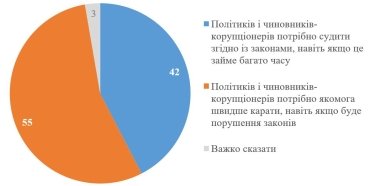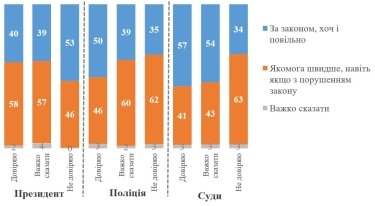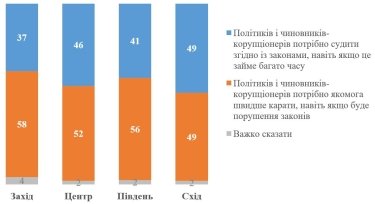Для более чем половины украинцев важным является немедленное наказание коррупционеров, даже если это потребует нарушения законов. Эти выводы стали результатом опроса, проведенного Киевским международным институтом социологии (КМИС).
Об этом свидетельствуют результаты опроса Киевского международного института социологии (КМИС). Как отмечают социологи, после широкомасштабной войны проблема №1 для украинцев – коррупция. Поэтому в декабре 2023 КМИС провел опрос, спросив украинцев, как именно нужно наказывать коррупционеров.
Так, более половины респондентов – 55% – хотят скорейшего наказания коррупционеров, даже если это будет через нарушения законов.
42% украинцев считают, что нужно наказывать по закону, даже если это займет много времени. Остальные 3% не определились со своим ответом.
Как подчеркивают социологи, чем меньше респонденты доверяют судам, тем большее требование наказывать как можно скорее даже с нарушением закона.
Так, среди доверяющих судам респондентов 41% говорят о необходимости как можно скорейшего наказания. В то же время среди респондентов, не доверяющих судам, таковых уже 63%. Подобная тенденция наблюдается и по доверию полиции.
При этом противоположная тенденция в случае доверия президенту. В этом случае больше настаивают на скорейшем наказании доверяющие президенту.
Во всех регионах, кроме Востока, преобладает стремление к скорейшему наказанию коррупционеров. На Востоке мысли разделились ровно пополам.
«Коррупция остается одним из крупнейших раздражителей в украинском обществе. На фоне критически низкого доверия к судам и прокуратуре все больше украинцев не будут видеть легальные пути достижения справедливости. Каждое следующее громкое коррупционное дело будет восприниматься еще более эмоционально. Мы уже видим, что большинство украинцев требуют наказания коррупционеров даже с нарушением законов. На самом деле это тревожная тенденция, поскольку входит в противоречие с развитием современного европейского правового государства», — комментируют в КМИС.





